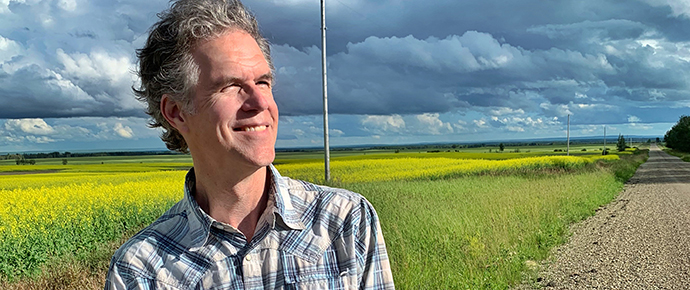
Just after the 2020 presidential election was called (the first time), I wrote a column here about how we’d all need to find new subjects to argue about just to keep us off the streets, or off of Facebook, Twitter, Parler, and Hablar (pronounced “hobbler”). I suggested a few bluegrass-related topics to satisfy our argumentative urge at least until the 2022 midterms.
I had no idea how quickly this would take hold, and we can thank a recent editorial by David Morris for this, followed by an opposing view by Richard D. Smith, which spawned a vigorous round of debate in the comments section. The controversy in question: who is really ‘The Father of Bluegrass,” Bill Monroe or Earl Scruggs? While the back-and-forth on this well-worn topic has been much more good-natured than any political squabble of 2020, it has spilled over into a Kentucky vs. North Carolina battle.
The topic was taken up in Lorraine Jordan and Carolina Road’s most recent bluegrass song about bluegrass, They Call it Bluegrass:
They call it bluegrass, born in Kentucky
But it was raised in Caroline
The sound of bluegrass came from the 5-string
Pick the banjo one more time
The song is making a statement about the importance of the 5-string banjo to bluegrass music (and that it should be picked one more time). It fails to point out, though, that after being raised in Caroline, it went to work in Tennessee, recorded in Chicago, and now hardly even comes home for Christmas.
For now, we’ll just let the North Carolina/Kentucky rivalry play out on the basketball court. But regarding who should be considered the true “Father of Bluegrass,” the answer is much less simple, and no free throws are permitted.
At this juncture, a brief review of bluegrass music history might be in order, and that may help clear up some misunderstandings:
In 1945, Charlie Parker started “bluegrass” music when he combined forces with Dizzy Gillespie. The two met while shopping for grass seed, always in great demand in Manhattan, giving Parker the idea for the name. The new music featured original material, improvised solos, a driving, fast-paced band sound, and the occasional Gospel quartet (Dizzy sang bass, Charlie sang tenor, me and little brother would join right in there). One of their most popular tunes at the time was Night in Tunisia (a.k.a. Toy Heart).
At the same time, in Nashville, Bill Monroe was developing a new string band sound he referred to as “bebop,” which is the name of a suburb of Rosine, Kentucky. The sound hadn’t fully come together as Monroe envisioned it, though, until he hired a young banjo player from North Carolina, Earl Scruggs (sometimes called “Don Reno”).
Parker and Monroe met in Chicago in 1946 and immediately envied each other’s genre names. They agreed to trade names if Monroe would also throw in his High Homburg hat. Trading Earl Scruggs for Dizzy Gillespie was also part of the original deal, but Monroe was angling for drummer Max Roach, too, because he was a better ballplayer than either Earl or Dizzy (Bill hadn’t had a decent shortstop in the band since Jim Shumate), and eventually the deal fell apart. They did trade the names “bluegrass” and “bebop,” though.
Fast forward to the formation of Flatt & Scruggs, the first bluegrass festival, the advent of electric bass, and the Iranian hostage crisis. What we call “bluegrass music” endures today, as does bebop, though now appreciated by an older crowd.
So after reflecting on these complicated origins, who can we definitively say started the genre of bluegrass? One of the commenters on the recent Bluegrass Today articles suggested that “Bill Monroe was the builder, Earl was the interior decorator.” The problem is that almost no one wants to be referred to as “The Interior Decorator of Bluegrass” (though if you’re interested in claiming the title yourself, it’s available). I know what he was driving at, though. I’ve often said that Bill Monroe was the doctor and Earl Scruggs was the other doctor, but working in Bill Monroe’s practice he had started a few years earlier. Don Reno was another doctor who was planning to work in Bill Monroe’s practice but ended up being an army doctor overseas, working in Bill’s practice a few years later after returning home, eventually starting his own practice with Dr. Red Smiley (internal medicine/rhythm guitar). Maybe this isn’t the best analogy. John Starling actually was a doctor. Does that help at all?
In his piece, David Morris stated that “virtuosity doesn’t equal paternity,” and wouldn’t life be complicated for some people if it did? One thing we know from basic biology is that there can only be one father of anything, but in this case, a paternity test would be awkward, so we have to accept that no matter how vital Earl Scruggs’ contribution was to the sound we call “bluegrass,” Bill Monroe is still going to be the Father of Bluegrass because it’s already named after him. That’s a ceremonial position rather than a biological one, but it was his practice, as I mentioned above. He owned the building and paid the power bill and the insurance.
Just to be clear on the rest of the family tree, Charlie Monroe was the Uncle of Bluegrass, James Monroe is the Brother of Bluegrass, Melissa Monroe is the Sister of Bluegrass. The Mother of Bluegrass is of course Marilyn Monroe.
In my opinion, the Stanley Brothers started bluegrass music because they recorded Molly and Tenbrooks first, and I just really like The Lonesome River. Prove me wrong. On second thought, don’t bother. I believe you.




